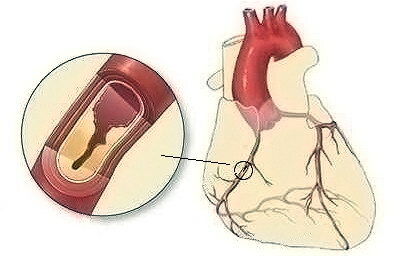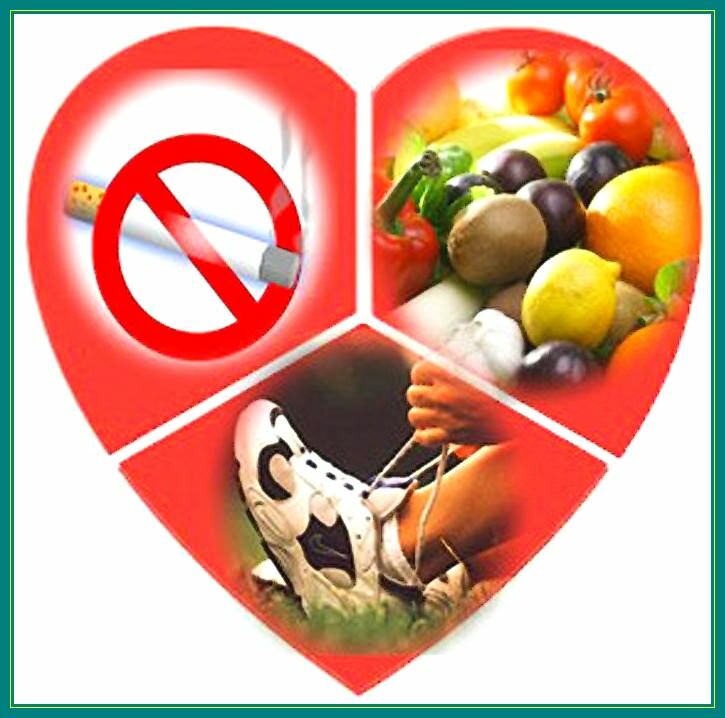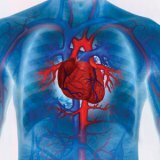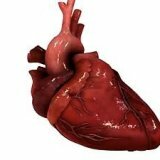Ischemic heart disease: symptoms, diagnosis, treatment

Ischemic heart disease is a failure of the blood supply to the myocardium( cardiac muscle).The disease is very dangerous - for example, with acute development of coronary heart disease immediately leads to myocardial infarction, which is the cause of death of middle-aged and elderly people.
Table of contents:Causes of coronary heart disease
The main cause of the development of this disease is coronary artery atherosclerosis, which is accompanied by the deposition of cholesterol plaques in the vessels and the narrowing of their lumen.
We recommend to read:Of course, atherosclerosis of the coronary arteries does not arise by itself - it is caused by improper diet, and bad habits, and a sedentary lifestyle.
It is noteworthy that coronary heart disease can occur acutely - in this case it will be about saving the life of the patient.But often enough the disease under consideration has a gradual development - at first narrowing of the lumen of the coronary artery is almost non-existent, and the patient will experience only mild, non-intensive symptoms during physical exertion, and after a while the illness will make itself felt even in absolute calm.

Classification of coronary heart disease
In ischemic heart disease, there is an insufficient supply of oxygen to the heart muscle, which can affect the patient's health in different ways: it all depends on the form of IHD.
Mute form of coronary heart disease
It is also called asymptomatic, because the patient does not experience any inconvenience, can not identify exact symptoms and generally considers himself absolutely healthy.This form of ischemic insufficiency is insidious - it can at any time turn into acute and then it will be hard to save a person.
To prevent the most severe development of the clinical picture, doctors recommend at least 1 time in 6 months to visit a cardiologist and undergo a preventive examination - this will help to identify the onset of coronary heart disease and provide timely assistance.
Stenocardia of tension
Regular onset seizures, chest pain, shortness of breath - these are the characteristics of angina pectoris.This form of coronary heart disease can last a long period, the patient will complain only about unpleasant feelings and worsening of health at physical exertion.
Unstable angina
A dangerous condition that may indicate the onset of myocardial infarction - at least, doctors place a patient with signs of unstable angina in the hospital and carry out not only treatment, but also 24-hour control of the heart muscle.
Unstable angina is manifested by rapid attacks, each subsequent will be characterized by pain intensity and addition of unusual symptoms.
Arrhythmic form of IHD
Flows in the form of atrial fibrillation, is characterized by heart rhythm disturbances, quickly and suddenly can go into a chronic form of percolation.
The arrhythmic form of coronary heart disease is often perceived by doctors as a signal for urgent actions - the patient is placed in a medical institution, he is given a full examination and competent treatment.
Myocardial infarction
This form of coronary heart disease is the most dangerous for the normal life of the patient - myocardial infarction refers to the process of death of a site of the heart muscle, which always proceeds in acute form.There is a development of myocardial infarction due to the detachment of the plaque or thrombus from the wall of the coronary artery, which leads to clogging of its lumen.
We recommend that you read:In this case, only professionals can help.
Sudden cardiac death
With a sharp decrease in the amount of blood supplied to the heart muscle due to complete blockage of the coronary artery, the heart stops and a person's clinical death occurs.
Note: all these forms of ischemic disease can develop / develop independently, but most often a combination occurs.For example, angina and arrhythmia are very often diagnosed simultaneously, which in the absence of treatment necessarily leads to myocardial infarction.
Symptoms of Ischemic Heart Disease
The disease under consideration can be quite secretive, therefore it is recommended to pay attention even to minor changes on the part of the heart. Disturbing symptoms are:
- recurrent pain in the chest that can give( irradiate) to the arm, scapula or neck;
- sensation of chest tightness;
- feeling of burning or heaviness in the chest;
- a recurring feeling of lack of air;
- feeling of anxiety for no apparent reason;
- general weakness;
- nausea and vomiting of unexplained etiology.
Treatment of coronary heart disease
When the first symptoms of the disease appear, after visiting the cardiologist's doctor and clarifying the diagnosis, the patient will be offered to change his life in the first place - to adjust both lifestyle and diet.Of course, drug therapy will be prescribed, and regular monitoring of heart function, and some folk remedies will be effective in treating coronary heart disease - therapy should be carried out in a complex manner.
Nutrition for IHD
The menu of a patient with diagnosed coronary heart disease should be based on the principle of rational nutrition, balanced use of foods with a low content of cholesterol, fat and salt.
It is necessary to exclude or significantly reduce the use of:
- meat and fish dishes, including broths and soups;
- bakery and confectionery products;
- sugar;
- dishes from semolina and rice;
- of animal by-products( brains, kidneys and others);
- sharp and salty snacks;
- chocolate;
- cocoa;
- coffee.
It is very important to include the following products in the menu:
-
 red caviar, but not in large quantities - a maximum of 100 g per week;
red caviar, but not in large quantities - a maximum of 100 g per week; - seafood;
- any vegetable salad with vegetable oil;
- low-fat meat varieties - turkey, veal, rabbit;
- skinny fish species - pike perch, cod, perch;
- sour-milk products - kefir, sour cream, cottage cheese, fermented baked milk with low percentage of fat content;
- any hard and soft cheeses, but only unsalted and inconsistent;
- any fruit, berries and dishes from them;
- yolks of chicken eggs - no more than 4 pieces per week;
- quail eggs - no more than 5 pieces per week;
- any porridge, except for semolina and rice.
Please note: should be eaten with diagnosed coronary heart disease 5-7 times a day, but in small portions.If you have extra weight, then you need to get rid of it - it's a heavy burden on the kidneys, liver and heart.
Changing the way of life
To prevent the development of the most severe forms of coronary heart disease, you must adhere to only three rules:
- Move more.Nobody says that it is necessary to put Olympic records, but to refuse a car, public transport and an elevator in favor of hiking is necessary.You can not immediately load your body with kilometers of roads covered - let everything be within reason.To ensure that physical activity does not cause deterioration( and this happens with ischemia!), Be sure to get advice from your doctor about the correctness of the training.
- Leave your bad habits in the past.Smoking and drinking of alcoholic beverages is like a blow that will necessarily lead to a deterioration in the condition.Even an absolutely healthy person does not get anything good by smoking and drinking alcohol, what can we say about the sick heart.
- Protect your nerves.Try to avoid stressful situations, learn to calmly react to trouble, do not succumb to emotional outbursts.Yes, it's hard, but it's this kind of tactic that can save lives.Consult with your doctor about the use of sedatives or decoctions of medicinal plants with a soothing effect.
Medication Therapy
As a rule, patients with diagnosed coronary heart disease are prescribed nitroglycerin and its derivatives - drugs that contribute to vasodilation.As a result, the blood flow along the coronary artery significantly accelerates and improves, the heart muscle is fully supplied with oxygen.
Acetylsalicylic acid is also effective. It prevents thrombosis of blood vessels and improves blood composition.Within the framework of therapy, medicines that reduce cholesterol can also be prescribed.
Pay attention to : no self-treatment can be out of the question!Any, even the most harmless at first sight, medicinal preparations should be appointed by a specialist.
Traditional medicine
Do not forget that to support the work of the heart muscle, increase the clearance in the vessels and prevent thrombosis of the latter can funds belonging to the category of "traditional medicine."Of course, you need to consult with your doctor and get his principal approval for the use of various decoctions and infusions from herbs - this is an indispensable condition for achieving therapeutic effect.
The most popular prescriptions for the means to be taken with ischemic heart disease:
Hawthorn
 Take 1 tablespoon of dried hawthorn fruit, pour 250-300 ml of steep boiling water and insist for 2-3 hours.It is better to cook everything in a thermos.The ready infusion is filtered through 2-3 layers of gauze.
Take 1 tablespoon of dried hawthorn fruit, pour 250-300 ml of steep boiling water and insist for 2-3 hours.It is better to cook everything in a thermos.The ready infusion is filtered through 2-3 layers of gauze.
How to use: 2 tablespoons of infusion three times a day for 20 minutes before eating.Duration of admission is 30 days, then you need to take a break for 2-3 weeks.
Hawthorn perfectly helps with angina and in combination with the herb of the motherwort - they take 6 tablespoons, pour 7 cups of boiling water and insist 10-12 hours.Take this broth should be 1 glass 3 times a day before meals.
Herbal pickings
Mix the leaves of mistletoe with white( 1 tablespoon) and buckwheat flowers( 2 tablespoons), pour all 300 ml of steep boiling water and leave to infuse for 10-12 hours( preferably overnight).You need to use 2 tablespoons of this infusion three times a day before meals.
Combine the grass of the jaundice, the ligulate flowers of the sunflower, the dill seeds( 2 tablespoons each) and the leaves of the mother-and-stepmother( 1 tablespoon).1 tablespoon of the mixture is poured into a glass of steep boiling water and insisted for 60 minutes.Take infusion of ½ cup 3 -5 times daily before meals.
Grind the corn root( 40 grams), add to it grass lovage medicinal in the same amount, pour water so that the mass was immersed in it completely, cook for 8-10 minutes.Then the broth is insisted for 40-60 minutes and take 1/3 cup three times a day after meals.
Mix the field horsetail, hawthorn flowers and the herb mountaineer's herb( each of 20 gr) and pour a glass of steep boiling water, insist for 20-30 minutes, drain.The received quantity should be drunk during the day in small sips.
Please note: all listed herbal preparations can be taken no more than 30 consecutive days.Then you need to take a break, go through a preventive examination and consult with your doctor about the advisability of further admission.
Horseradish
It is used to make inhalations that will be useful in coronary heart disease and other diseases of the main organ in the body.
Grate 5 gr of horseradish on a fine grater, pour a glass of steep boiling water and insist for 1 hour.Then inhalation is done either over a wide and shallow basin( bowl), or over the spout of the teapot.
Diagnosis of coronary heart disease is the main thing in the whole process of treating this insidious disease.It is impossible at the first pains in the chest to make a decision on what is developing the disease in question.The most sensible thing is to immediately call on specialists to conduct a full-fledged examination and a precise diagnosis.
Tsygankova Yana Aleksandrovna, medical reviewer, therapist of the highest qualification category



